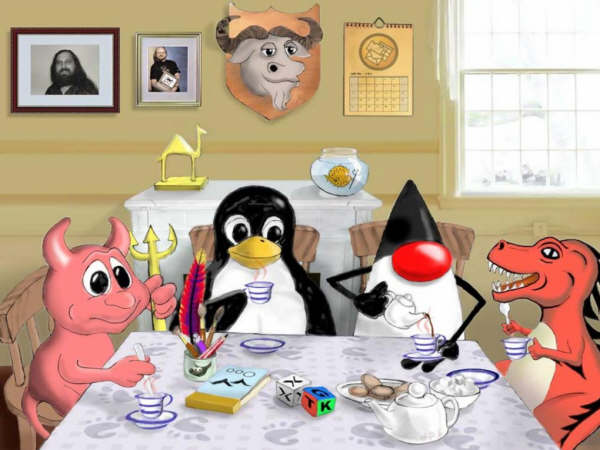
- This event has passed.
The Attraction of Contributors in FLOSS
02/11/2011 @ 7:30 pm - 11:00 pm
The Attraction of Contributors in Free/Libre and Open Source Software

For this talk, we are honoured to have Dr Carlos Denner discuss FLOSS projects and describe how the various aspects of a project determine how attractive that project is to the contributors who could improve it further.
Dr Denner is a researcher at the Horizon Institute, University of Nottingham.
All at our usual venue:

54 Canal Street
Nottingham, NG1 7EH
Telephone: 0115 9506795
To find us, go through to the back of the pub and we’re up the spiral staircase in the restaurant. Just ask one of the friendly bar staff for NLUG if lost.
Food is also served through into the evening.
Wednesday 02/11/2011:
- 7:30pm: Meet
- 8:00pm: Talk
- 9:00pm: General discussions
Cuddly Gnus, Penguins, and All welcome!
Cheers,
Martin

20 comments to The Attraction of Contributors in FLOSS
Leave a Reply
You must be logged in to post a comment.

Thanks to Carlos for a very interesting talk. And thanks again Carlos for making time for our group just before returning to Brazil.
The paper mentioned is Attractiveness of Free and Open Source Software Projects – Presented at 18th ECIS (pdf). There is a more recent and updated version that is awaiting publication – TBA.
So… The main message I picked up is that, at least from the examples seen on sourceforge, sponsorship of some kind is required for a FLOSS project to survive. Also, that in the business world there is a strong view that secrecy and controlled/restricted use are the most profitable ways to go. Hence with that ‘business view’, the freedom guaranteed by the GPL is seen as being ‘restrictive’ for business exploitation! And yet, big business also depends upon, and has gained high profitability from, the use of GPL-protected FLOSS…
A particularly interesting comment from Carlos is: “The range of uses is smaller with the GPL, however the fewer uses that the code eventually finds will be kept public. It is a price that you have to pay to guarantee that eventual derivative work will be public.”
Another aspect is that there can be some very strongly held (pure?) views that contrast starkly between some parts of the business world and those of the FLOSS world. So much so as to be likened to an uncompromising religious war. Is that really more than just a difference of philosophies? Is there also a contest between those businesses that profit from FLOSS vs those that depend upon exploiting less open business strategies?
For further study?… 😉
For the figures in the “Open Source Family Portrait”, we’ve identified:
Richard Matthew Stallman (“rms”);
Eric S Raymond (“esr”) holding “The Cathedral and the Bazaar” book;
GNU;
The old Evolution logo before Gnome;
Microsoft (Windows);
Camel toolkit for Apache;
Blowfish (with a trident);
BSD Daemon;
Tux (Linux kernel);
Duke (Java);
Mozilla;
Wilbur (GIMP);
Apache feather;
OpenOffice notebook;
X Windows dice;
GTK dice;
And all seem to be enjoying a lovely cup of Java on a Gnome tablecloth.
Is the Java mascot using its own teapot rather than the system provided one?…
Anything we’ve missed?
And the other portrait is of Skipper, Kowalski, Private and Rico! 🙂 (And is SKiPpeR yet another of those recursive self-referential acronym thingies?! 😮 )
Cheers,
Martin
Two recent articles that highlight the importance and significance of ‘what licence’ to use are:
Open core or dual licensing? The example of MySQL
and
Open Source, Open Science, Open Source Science.
The first example demonstrates the difference in view/perspective between ‘traditional’ business exploitation and (altruistic) contributors, and the ensuing manoeuvring to try a new model of licensing/business. There is also the example there of what encourages a ‘fork’ of the project to be made.
The science example shows how licensing/embargoes driven by business motives can act to undermine the very subject being supported.
Thankfully, so far we have a choice!
One thought is whether two useful categorisations of software might be (1:) “infrastructure” for software that is very widely used (and should be freely available?) where open licensing is appropriate, and (2:) that of “niche” for software that has a very small audience and could only ever exist in a ‘business’ setting. (Then again, there’s also a lot of ‘niche’ software written as a one-off by individuals for whatever myriad individual reasons, but how many of those ever get to see a wider audience?)
Cheers,
Martin
Some real-world examples are published by 42 authors on:
Open source players share their experiences in CC-BY-SA book
Cheers,
Martin
An interesting observation in the world of Android (Bionic/Linux):
Why a tablet victory for Android is problematic for Free Software
And one comment is:
One very practical example of cooperative sponsorship is:
Improved OOXML support for LibreOffice and OpenOffice
For a brief selection of associated research and reports:
Sustainability of Free/Libre Open Source Projects: A Longitudinal Study (Journal of the Association for Information Systems, 2010)
Free/Libre and Open Source Software: Survey and Study – FLOSS FINAL REPORT (International Institute of Infonomics, University of Maastricht, The Netherlands, Berlecon Research GmbH, Berlin, Germany, June 2002)
The impact of Free/Libre Open Source Software on innovation and competitiveness of the European Union (European Commission, 2006)
FLOSSSim: Understanding the Free/Libre Open Source Software (FLOSS) Development Process through Agent-Based Modeling (Radtke, Nicholas P. PhD thesis 2011)
Identifying Success and Abandonment of Free/Libre and Open Source (FLOSS) Commons: A Preliminary Classification of Sourceforge.net projects (Upgrade: The European Journal for the Informatics Professional, Journal issue on “Free Software: Research and Development”, 2011)
‘Open Source’ and ‘open source contribution’ get into the popular press:
BBC – Open-source project to get gadgets talking via the net:
BBC – Why companies must adopt the open source way:
And here is good comment and examples about funding FLOSS projects:
How can we pay for Free Software?
For examples of one developer’s experiences and ideas:
How to earn a living making Open Source software
Recently, an interesting phenomenon launched in 2009 that has hit the news is:
Kickstarter is a funding platform for creative projects.
That is also helping FLOSS projects…
Here is an interesting example of FLOSS in action for the benefit of a user and contributor, and for everyone else:
The forkers saving open source from a corporate bear hug
There is a book by Charles M. Schweik and Robert C. English published 08/06/2012 detailing their survey study of the success or otherwise of sourceforge projects:
(Amazon Books) Internet Success: A Study of Open-Source Software Commons
They have even made their data available :
APPENDICES and SUPPLEMENTARY DOCUMENTS
Linaro, a not-for-profit engineering organization that works on consolidating and optimizing open source software for the ARM architecture gets some exposure by The Register:
Linaro Linux-on-ARM effort sets sights on network gear
A comment in one of the comments for that article gives a very nice summing up:
Free’s a crowd-funding
What’s in a (Free Software project) name?
Already, a decade of WordPress: Ten Good Years
Spectacular stuff and this website shows that it all works well and easy. Easy enough even for me! Spectacular indeed! 🙂
Hi Martin!
The paper that summarizes the discussion we had that day is finally out: https://www.sciencedirect.com/science/article/pii/S0963868712000340
A copy is available here as well: https://carlosdenner.blogspot.com.br/p/publicacoes.html
Cheers,
Carlos.
Here is a good story and very good summary by Jelmer Vernooij of how one prominent project became out-evolved in the world of version control systems by a certain Git…
Bazaar-NG: 7 years of hacking on a distributed version control system
… And the rest became history…
I found that example interesting for that project ‘looking good’ to then be overtaken by outside political and development events regardless. Thus we now have Git gaining majority favour, regardless of imperfections.
The article appears to be from around mid 2012. Note the naming for the Bazaar project and the book by esr: “The Cathedral and the Bazaar“.
What is this?… Some big corporates helping out to make more FLOSS projects succeed?… Here is what The Register reports:
This time it’s SO REAL: Overcoming the open-source orgasm myth with TODO
All a question of how you spin the web?
Perhaps this is one development to watch to see if beyond the game of recursive acronyms so often enjoyed by projects, whether this project itself succeeds!
ps: There is a puntastic rather than recursive meaning to note:
TODO has another meaning
Here is an example of how time and developments can move on to overtake a successful long running project:
The Register: M0n0wall comes tumbling down as dev throws in the trowel
The comments to that article start with the flourish that “Financial models matter”… And although that comment does name a certain extreme example, there is also the example of how the m0n0wall continued for over a decade. There are many ways to different measures of success…
Here is a recent example of the power of freedom for a high profile project and for how the ‘freedom’ includes the community of contributors, users and supporters. The Register reports:
Fork YOU! Sure, take the code. Then what?
There is a lot of value in people, communities, and freedom: FLOSS.